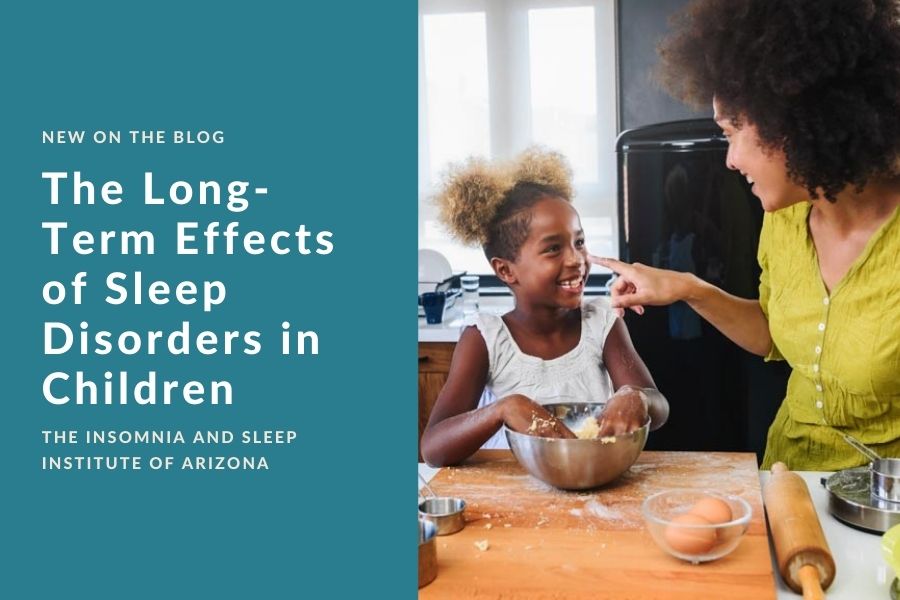People of all ages struggle with sleep disorders, which is why The Insomnia and Sleep Institute of Arizona treats adults and children as young as two years old. Recognized as the “Face of Sleep Medicine” in Arizona, we have received the “Top Doc” status (as selected by sleep specialist peers) in the area for the last six years. With unprecedented staffing levels, including three sleep specialists on site, a clinical psychologist specializing in CBT for insomnia, and respiratory therapists, we are outcome-driven and committed to correctly diagnosing your child before moving on to treatment and testing.
Children who have obstructive sleep apnea (OSA), the most common type of sleep apnea, are three times likelier to have high blood pressure as teenagers compared to those who never had sleep apnea. This research study was funded by the National Heart, Lung, and Blood Institute and provides parents with an even more pressing reason to have their children seen by a pediatric sleep specialist if there is any hint of a sleep disorder.
Pediatric Sleep Medicine
The good news is that kids who experience an improvement in their sleep apnea also decrease their risk of developing high blood pressure to the level of their peers who never had sleep apnea. CPAP therapy remains the standard care for managing OSA for patients of all ages, and today’s technology makes more options available to ensure a comfortable mask and tubing is available for all ages and sizes. The study was long-term and underscores the importance of early treatment for OSA (the complete study can be found in JAMA Cardiology).
OSA occurs when someone repeatedly and quickly stops breathing as they sleep. Most OSA patients are adults, but it does occur in 10 percent of K-12 children. Nearly half of these kids will naturally outgrow their sleep apnea, but that means it is chronic for the other half. It is nearly impossible for doctors to predict which child will outgrow sleep apnea and which will not (though there are some exacerbating factors, such as obesity), so ensuring every child (and adult) with OSA receives treatment is critical.
Treat Your Child’s Sleep Disorder Today
There are many studies that tie OSA with high blood pressure in adults, but research related to children’s sleep disorders is relatively scant. However, the researchers say that their study “showed that pediatric sleep apnea can act as a gateway to future hypertension.” Parents may not always notice this stop-and-go breathing pattern in their children at night, but bear in mind that OSA can also have daytime effects such as fatigue, cognitive issues, and hyperactivity.
The study included 421 children who were monitored overnight, which revealed that 12 percent had OSA. The children were between 5 – 12 when the study began and researchers revisited them after eight years (12 – 23 years old). Those who still had sleep apnea as teens specifically had a certain type of high blood pressure, orthostatic hypertension, which happens when a person stands up quickly from laying down. This is a marker for heart disease as an adult.
Get Your Child the Sleep They Need
Fortunately, more and more studies are focusing on pediatric sleep patients and highlighting the importance of quality sleep. Another study found that children who snore regularly actually experience structural changes in their brain linked to behavioral issues such as hyperactivity, learning troubles, and lack of focus. This research is found in Nature Communications and it considered MRI images of over 10,000 9 – 10 year old children. The results showed that kids who snored 3+ times per week (as reported by parents) had thinner gray matter in many parts of the frontal lobes, the area related to impulse control and reasoning.
If you notice or suspect any sleep disorder problems with your child, the sooner you get treatment the better. The first step is seeing a sleep specialist during a consultation so that you can secure a correct diagnosis and explore testing and treatment, if applicable. To get started, no referral is needed. You and your child can see a sleep specialist directly to get the answers you deserve. Simply connect with The Insomnia and Sleep Institute by calling the office or, for a quicker response, complete the online form.





